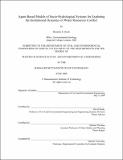Agent-based models of socio-hydrological systems for exploring the institutional dynamics of water resources conflict
Author(s)
Kock, Beaudry E. (Beaudry Evan)
DownloadFull printable version (7.983Mb)
Other Contributors
Massachusetts Institute of Technology. Dept. of Civil and Environmental Engineering.
Advisor
David Marks.
Terms of use
Metadata
Show full item recordAbstract
The Basins-At-Risk theory formulates relations between institutional capacity in a basin and the level of water conflict in that basin, suggesting that higher levels of institutional capacity will lead to reduced levels of water conflict in a given system. I test the substance of this theory using comparative, simulation-based analysis of water resources systems in the USA and Spain. I determine whether, given two artificial societies experiencing water conflict, expanding institutional capacity would indeed lead to reduced conflict levels. I develop and apply two agent-based models of society and hydrology: one for Albacete, Spain, and the other for the Snake River, eastern Idaho,USA. Each model incorporates essential elements of the regional society: real world actors are translated into proactive deliberative agents using a BDI framework; the hydrology/geology is represented either through use of pre-existing models, or basic hydrologic simulation; economic, societal and other dynamics are represented through additional databases and agent rule bases. I apply the models experimentally to explore the societal effects of adding an additional institution to the existing water resources management institutions: ground water banking, a new set of rules for agents to interact with their hydrologic system. I run both models over historical and projected time periods, testing out different scenarios of variation in internal and external agent environment to explore the detailed dynamics of each system. Results and analysis suggest that institutional capacity and water conflict dynamics are strongly related, but that the direction of influence can vary. I identify critical elements of the design of ground water banking institutions, when considering their potential success in mitigating conflict. (cont.) I also investigate the possibilities of engineering a universally portable sociohydrologic agent, and discover that while the concepts of the chosen cognitive architecture may be portable, it is effectively impossible to guarantee a fully portable technical implementation.
Description
Thesis (S.M.)--Massachusetts Institute of Technology, Dept. of Civil and Environmental Engineering, 2008. This electronic version was submitted by the student author. The certified thesis is available in the Institute Archives and Special Collections. Includes bibliographical references (p. 186-192).
Date issued
2008Department
Massachusetts Institute of Technology. Department of Civil and Environmental EngineeringPublisher
Massachusetts Institute of Technology
Keywords
Civil and Environmental Engineering.